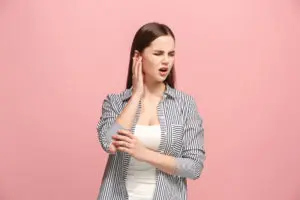Tinnitus comes from Latin meaning to ring or tinkle. 50 million Americans, or 15% of the population, suffer from this audiological and neurological issue. In simple terms it is a sound that no one else hears, like ringing in the ears. There are, in fact, additional sounds like buzzing, whooshing, hissing and clicking that a person with Tinnitus may experience.
For those with Tinnitus it can be just annoying, or it can become debilitating, depending on the severity. To date there is no scientific cure, but treatment options can help to mitigate the symptoms.
Types Of Tinnitus 
There are two types of Tinnitus. Almost all patients have Subjective Tinnitus which is normally tied to some type of hearing loss and only the patient can hear the noises.
Objective Tinnitus is a very rare form where some noises can be heard especially by your doctor during an exam. These sounds arise from the circulatory system or musculoskeletal movement or muscle contractions.
What Causes Tinnitus
The Mayo Clinic designates Tinnitus as the symptom of another condition. Something as simple as too much earwax can cause Tinnitus.
Some other causes and risk factors for Tinnitus include:
- Continual exposure to loud noise. This can include musicians, construction and factory workers, as well as those in the military. Someone who attends a loud concert may experience a temporary case of Tinnitus.
- Age related hearing loss. As we age our hearing decreases which can lead to Tinnitus.
- Head and neck injury affecting the inner ear and hearing nerves.
- Certain medications like antibiotics, antidepressants, diuretics and cancer meds.
- High blood pressure combined with stress.
- Alcohol and smoking may make Tinnitus more noticeable.
- Sinus infections and pressure.
- Heart, blood vessel and thyroid problems.
Some Treatment Options For Tinnitus
A person who suffers with Tinnitus can become depressed, have trouble sleeping, experience memory loss, anxiety and fatigue. See your ear, nose and throat doctor if Tinnitus begins to affect your life and ability to enjoy day to day activities.
To help with the annoying sounds, try noise suppression. Listen to “white” noise like ocean waves or gently falling rain. Use a fan in the bedroom to sleep better.
Wear hearing aids; the better you hear, the less you will notice the Tinnitus.
Consciously reduce your exposure to loud noise whenever possible. Move away from speakers, turn down the volume and wear earplugs.
Counseling may be helpful to manage your anxiety and help you to relax during the day and fall asleep at night.
Tinnitus Resources
Below are a few links with actual Tinnitus sounds. This may aid in discovering which sound among many might be closest to your own if you suffer with Tinnitus. Turn down speakers to listen.
https://www.ata.org/understanding-facts/symptoms
Request an Appointment Today
If you or someone you know has Tinnitus, or you think you may have it, seek help from your ENT doctor for other treatment options. To schedule a consultation with the ENT specialists of Coastal Ear, Nose & Throat, please call our office (912) 355-2335 today.

